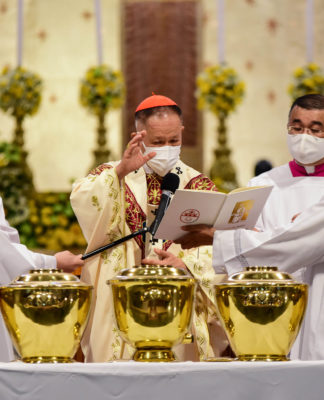THE PRESIDENT has said he was willing to be excommunicated for supporting the controversial Reproductive Health (RH) bill, but for Church law experts, all this talk of sanctions is nothing but the product of “confusion.”
Msgr. Gary Noel Formoso, judicial and episcopal vicar of the Archdiocese of Nueva Segovia, told the Varsitarian excommunication in connection with one’s pro-RH bill stand was “out of the question.”
“It was [President Aquino] who said ‘I will support this bill, even if they excommunicate me!’ This statement, I guess, is the cause of the confusion,” he said.
President Benigno Aquino III made the statement during the graduation rites of the University of the Philippines, in the thick of the debate over the RH bill, which seeks to establish a massive, state-funded birth control program employing contraceptives deemed by experts as abortifacients.
The fuss over excommunication began with a radio interview last October, featuring Tandag Bishop Nereo Odchimar, president of the Catholic Bishops’ Conference of the Philippines.
It was, ironically, Church-run Radyo Veritas that fuelled the maelstrom, when an announcer speculatively asked Odchimar whether Aquino risked incurring the extreme penalty for supporting the distribution of contraceptives.
Odchimar said: “[R]ight now it is not a proximate possibility. But right now we are open for dialogue…”
A Veritas transcript erroneously omitted the word “not.” The following day, newspapers reported that Odchimar had threatened to excommunicate the President. Odchimar is not even Aquino’s bishop. The archbishop of Manila, Cardinal Gaudencio Rosales, had already ruled out excommunication.
Indeed, abortion is punishable by excommunication, but under Church rules, one must be directly involved in the procedure to incur the penalty latae sententiae, or automatically.
‘A process of healing’
In Roman Catholicism, excommunication is the most severe of all ecclesiastical penalties and is a censure that may bar or limit the participation of a person in the religious community.
But according to AMV-College of Accountancy Regent Fr. Isaias Tiongco, O.P., it can also be called “medicinal penalty”—it intends to make the wrongdoer realize the gravity of his offense, and then lead him to the act of contrition and his reintegration to the Church.
“[Excommunication] is a process of healing,” he said, adding that excommunication takes the tone of the parable of the prodigal son, where the father welcomes back his son with open arms.
The Code of Canon Law states that an excommunicated person is forbidden from ministerial participation in the celebration of the Eucharist or any other ceremonies of public worship, the sacraments, and the exercise ecclesiastical offices, ministries, functions or acts of governance.
Aside from abortion, grounds for excommunication latae sententiae include the profanation of the Holy Eucharist, physical violence against the person of the Roman Pontiff, and the ordination of a bishop without the apostolic mandate.
The penalty is in effect upon the commission of the offense, but the bishop has to make a declaration.
Tiongco said the Catholic Church is benevolent in imposing penalties, adding that any sanction may be lifted upon the discretion of the ecclesiastical authority, taking into consideration the gravity of the offense.
Latae sententiae excommunications contained in the code—involving offenses such as apostasy, heresy, schism and abortion—can be absolved in accordance with the norms established in Canons 1354 to 1363.
But Formoso, who is taking up his doctorate in Canon Law in UST, said Aquino may still face “ecclesiastical penalties, but not directly in connection with abortion.”
Tiongco said that technically, excommunication was “possible” for Aquino on the grounds of heresy and schism.
“In the bill, there is mandatory sex education, which imparts the teaching of using contraceptives. This is contrary to the Catholic teachings. [Excommunication here] is by reason of heresy,” he said.
According to Tiongco, heresy is defined as the post-baptismal denial of the Catholic truth and teachings, while schism is the refusal to submit oneself to the Holy Father and to those in communion with him. Both fall under latae sententiae, where the person automatically incurs the censure on the mere commission of the offense.
History of ‘cut-off’
The history of the Church shows that a huge number of Christians, mostly of royalty, have been excommunicated.
One of the well-known excommunications in history was that of King Henry IV, the Holy Roman Emperor of the 16th century, in which he was deposed by Pope Gregory VII when the former tried to take control of clergymen.
Henry was said to have travelled to meet and beg forgiveness from the Pope. The event was called the Walk to Canossa.
Another infamous event in Church history was the excommunication of Martin Luther by Pope Leo X for his rebellion against the Church and, later on, the emergence of Protestantism.
Much recent is the excommunication of Margaret McBride, a nun who allowed abortion to be performed to a mother suffering from pulmonary hypertension.
Formoso said the Church is like a “perfect society” governed by laws and anchored by goals, but its nature is different from that of civil society.
“[T]he Church moreover is governed by the sacred canons of the Code of Canon Law, which is also rooted on the word of God and Divine Law,” he said.















